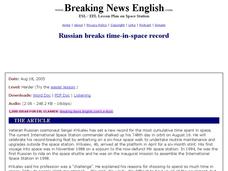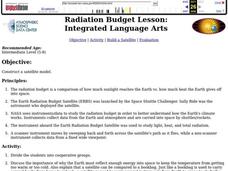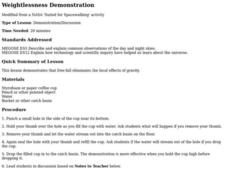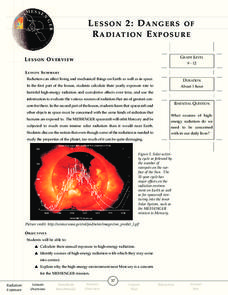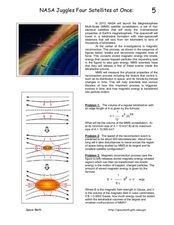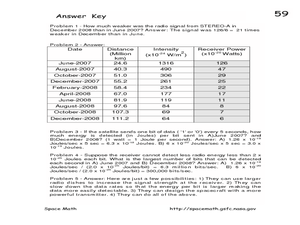Curated OER
Breaking News English: Shuttle Discovery Launches Successfully
For this English worksheet, students read "Shuttle Discovery Launches Successfully," and then respond to 47 fill in the blank, 7 short answer, 20 matching, and 8 true or false questions about the selection.
Curated OER
Breaking News English: Russian Breaks Time-in-Space Record
In this English worksheet, students read " Russian Breaks Time-in-Space Record," and then respond to 1 graphic organizer, 27 fill in the blank, 15 short answer, 20 matching, and 8 true or false questions about...
Curated OER
Good Vibrations Remote Sensing data Collection: Thermal Emission Spectrometer
The Mars Global Surveyor spent two years creating a mineral map of the planet Mars using thermal emission spectrometry. To help young astronomers understand this remote sensing instrument, have them simulate how data is collected and...
Curated OER
#24 Rotating Frames of Reference in Space and on Earth
Students explore rotating frames of reference, focusing on the weightless environment in space and the Coriolis force.
Curated OER
Blazing Gas
Fourth graders read and discuss the sun and the energy we use on Earth from the sun. In this sun lesson plan, 4th graders discuss the solar system, planets, and answer short answer questions.
Curated OER
Catch Some Rays?
In this online interactive science rays worksheet, students read 5 questions and choose the multiple choice answer that answers each question correctly. Students answer 1 science question on rays online in the box provided.
Curated OER
Mars 500: Would You Go?
In this Mars worksheet, students read a 7-paragraph article and respond to 8 graphic organizer, matching, and short answer questions. Vocabulary words and definitions are included.
NASA
Packing for a L-o-o-o-ng Trip to Mars
Pack just enough to fit. Crews determine what personal items to take with them on a trip to Mars. Each team must decide what to take with them on a two-and-a-half year trip to Mars and whether their items will fit within the allotted...
Messenger Education
Look But Don’t Touch—Exploration with Remote Sensing
Mars is home to the tallest mountain in our solar system, Olympus Mons. In this set of two activities, learners review geologic land formations through the analysis of aerial maps. They then apply this knowledge to aerial maps of objects...
Laboratory for Atmospheric and Space Physics
Charting the Progress of New Horizons
In 2006, New Horizons began its mission to fly to Pluto. As it continues its journey, scholars track its progress with the help of an informative website, all the while reinforcing measurement concepts with the construction of a scaled...
University of Colorado
Astro-Chronology
Class members play a version of the game Chronology to determine when certain scientific events occurred in history. Teams play until someone has 5-10 events in the correct order.
Curated OER
Radiation Budget
Students examine the radiation budget and the launching of the Budget Satellite. They role-play as designers of the satellite and construct one with a power source, instruments, and sensors. they explain how their satellite functions...
Curated OER
Space, the Final Frontier...
Students study a common theory on how the solar system was formed and examine the relative scale of the size and distances among the bodies of the Solar System.
Curated OER
Motion Near Earth
In this motion worksheet, students will match 5 physics vocabulary words relating to motion with their definitions. Then, they will review 9 statements of different motion scenarios to determine is the statement is true or false....
Curated OER
Weightlessness Demonstration
Middle schoolers explore the concept that free-fall eliminates the local effects of gravity. They discuss what an Earth-orbiting spacecraft experience is like as well as the terminology of weightlessness. Their lab experiment commences.
Curated OER
NIH Image Fault Investigation
Students use the image processing software, NIH Imageto view images of Earth taken from the space shuttle. They use NIH Image to determine the length of the visible portion of the fault, where it has ruptured the Earth's surface.
Curated OER
Extra Terrestial Excursions
Fourth graders determine how long it would take to fly to each of the planets in the solar system. They do two calculations: one, if they were using conventional jet, the other if they were using the fastest spacecraft possible.
Curated OER
Solving Saturn's Mysteries
Students study the Cassini spacecraft and its travel to Saturn. They discover the results of the space mission and examine images of Saturn that Cassini sent back.
Curated OER
Animating Motion
Learners apply what they recall about objects in motion by animati ng sequences of pictures that model a set of physical conditions. They animate the orbital motions of the Earth, the space shuttle, and the Moon based on calculations of...
Curated OER
Dangers Of Radiation Exposure
Students investigate the effects of radiation exposure and how it can effect objects on earth and space. They conduct research using a variety of resources and use the information to create a project that is reflective of good research...
Curated OER
NASA Juggles Four Satellites at Once
In this NASA satellites worksheet, students read about the Magnetosphere Multi-Scale satellite constellation that NASA will launch in 2013. They solve 4 problems including finding the volume of the MMS constellation, finding how long it...
Curated OER
The STEREO Mission: Getting The Message Across
In this STEREO satellites worksheet, students are given a chart with the intensity of the signals from the satellites received on Earth and the distances of the satellite from Earth. Students convert the intensity at each distance to...
Curated OER
Cooler in the Shadows
Students explore Earth science by creating a scale model in class. In this shadow lesson plan, students research the impact the sun has on Earth shadows and complete a space science worksheet. Students create models of the Sun and Earth...
Curated OER
Mass Spectrometer
In this mass spectrometer worksheet, students read about how a mass spectrometer determines the elements in gases around Earth. Students answer 3 questions and identify the elements in a graph found by a mass spectrometer.

